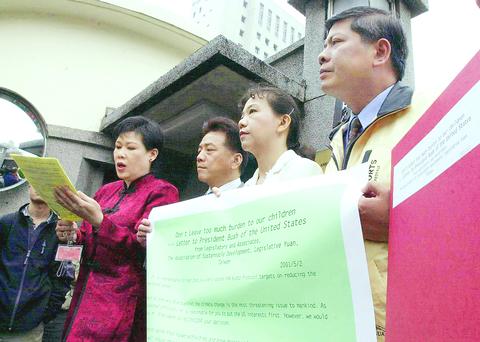Legislators urged the American Institute in Taiwan (AIT) yesterday to forward a letter to the White House urging US President George W. Bush to reverse his decision to abandon the Kyoto Protocol.
The Kyoto Protocol is a UN climate pact which requires major industrialized nations to reduce emissions of carbon dioxide and other pollutants by an average of 5.2 percent below 1990 emissions levels before 2012.

PHOTO: CHIANG YING-YING, TAIPEI TIMES
On March 29, the US announced it had effectively abandoned the pact on the grounds that it does not force developing countries to curb emissions and because Bush said the plan is not in the economic interests of the US.
Bush's decision to kill the protocol angered not only many European countries but also developing countries as well.
Concerned about sustainable development on the planet, legislators from the Association of Sustainable Development (永續發展促進會) and environmentalists from the Taiwan Environmental Protection Union (台灣環保聯盟) yesterday asked the AIT to forward a letter to Bush titled "Don't leave too much burden to our children."
Legislators, including independents Josephine Chu (
Concerning greenhouse gas emissions by various countries, "the UN Framework Convention on Climate Change does emphasize its principle of equal but differentiated responsibilities in regulation," Chu read from the letter at the AIT.
Although developing countries are not bound by the pact, the legislators said that those countries would eventually participate.
Taiwan, as a non-UN member, is not bound by the protocol. But, to avoid any economic sanctions by the international community, Taiwan has been mapping out its own policies in conjunction with international trends in global environmental protection over the last 10 years.
The beginning of such action was prompted in part by the 1987 Montreal Protocol, an international agreement controlling the production and consumption of ozone-depleting substances, such as CFCs, which are used in refrigerators, aerosol propellants and solvents.
To shoulder the responsibilities of preserving natural re-sources with other countries for future generations, Taiwan decided in 1999 to reduce its total emissions of carbon dioxide to 297 million tonnes from an estimated 501 million tonnes by 2020.
Legislators said yesterday that they hoped that the US would come up with innovative strategies to shoulder the responsibility of protecting the planet rather than dismissing the Kyoto Protocol.
William Weinstein, chief of the AIT's economic section received the letter from the legislators. Wienstein however declined yesterday to speak to the media on the issue.
Officials at the AIT public relations office said that the letter would be forwarded as soon as possible to the White House through normal channels but they did not know how long the process would take.
The AIT had no other comment on the letter, explaining that it was addressed to the White House and not their office.

MAKING WAVES: China’s maritime militia could become a nontraditional threat in war, clogging up shipping lanes to prevent US or Japanese intervention, a report said About 1,900 Chinese ships flying flags of convenience and fishing vessels that participated in China’s military exercises around Taiwan last month and in January last year have been listed for monitoring, Coast Guard Administration (CGA) Deputy Director-General Hsieh Ching-chin (謝慶欽) said yesterday. Following amendments to the Commercial Port Act (商港法) and the Law of Ships (船舶法) last month, the CGA can designate possible berthing areas or deny ports of call for vessels suspected of loitering around areas where undersea cables can be accessed, Oceans Affairs Council Minister Kuan Bi-ling (管碧玲) said. The list of suspected ships, originally 300, had risen to about

DAREDEVIL: Honnold said it had always been a dream of his to climb Taipei 101, while a Netflix producer said the skyscraper was ‘a real icon of this country’ US climber Alex Honnold yesterday took on Taiwan’s tallest building, becoming the first person to scale Taipei 101 without a rope, harness or safety net. Hundreds of spectators gathered at the base of the 101-story skyscraper to watch Honnold, 40, embark on his daredevil feat, which was also broadcast live on Netflix. Dressed in a red T-shirt and yellow custom-made climbing shoes, Honnold swiftly moved up the southeast face of the glass and steel building. At one point, he stepped onto a platform midway up to wave down at fans and onlookers who were taking photos. People watching from inside

Japan’s strategic alliance with the US would collapse if Tokyo were to turn away from a conflict in Taiwan, Japanese Prime Minister Sanae Takaichi said yesterday, but distanced herself from previous comments that suggested a possible military response in such an event. Takaichi expressed her latest views on a nationally broadcast TV program late on Monday, where an opposition party leader criticized her for igniting tensions with China with the earlier remarks. Ties between Japan and China have sunk to the worst level in years after Takaichi said in November that a hypothetical Chinese attack on Taiwan could bring about a Japanese

STREAMLINED: The dedicated funding would allow the US to transfer equipment to Taiwan when needed and order upgraded replacements for stockpiles, a source said The US House of Representatives on Thursday passed a defense appropriations bill totaling US$838.7 billion, of which US$1 billion is to be allocated to reinforcing security cooperation with Taiwan and US$150 million to replace defense articles provided to the nation. These are part of the Consolidated Appropriation Act, which the US House yesterday passed with 341 votes in favor and 88 against. The act must be passed by the US Senate before Friday next week to avoid another government shutdown. The US House Committee on Appropriations on Monday unveiled the act, saying that it allocates US$1 billion for the Taiwan Security Cooperation Initiative